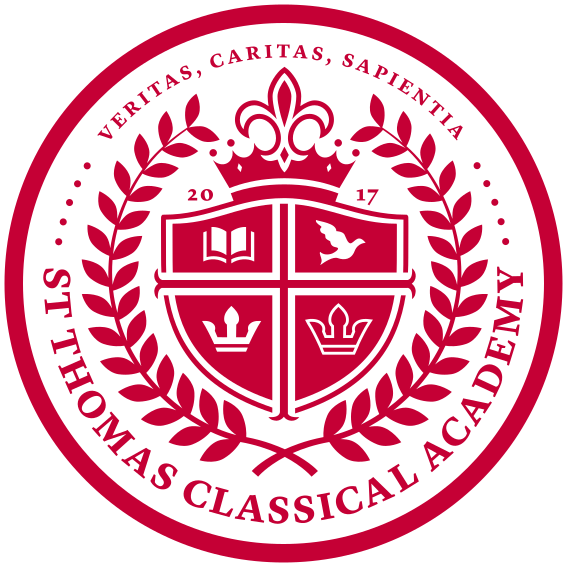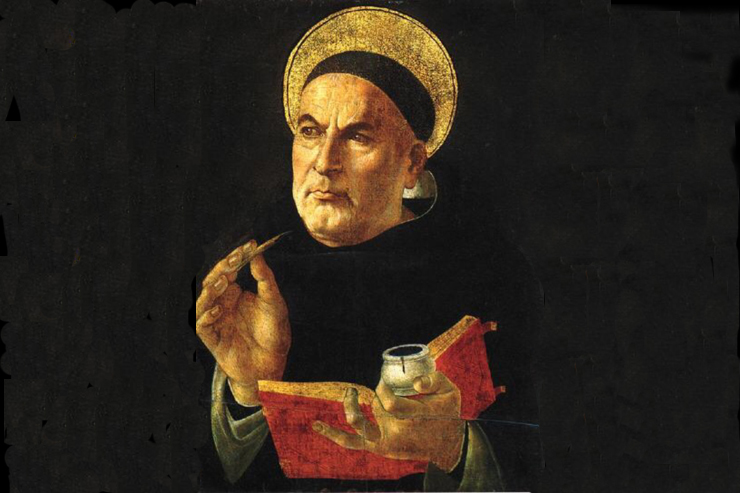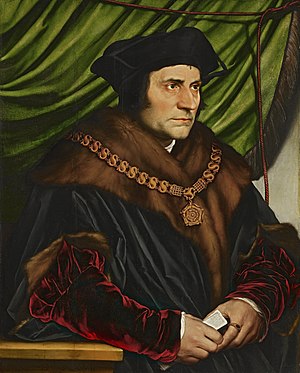VISION
At St. Thomas Classical Academy, students, parents, and faculty accompany one another in the pursuit of wisdom. Our rigorous classical education and cultivation of an authentic Catholic culture allow our students to encounter truth, goodness, and beauty and to deepen their love for Christ, His Mother, and His Church.
Parents as principal educators
Since parents have given children their life, they are bound by the most serious obligation to educate their offspring and therefore must be recognized as the primary and principal educators. -Pope Paul VI, Gravissimum Educationis
As a hybrid academy, St. Thomas Classical Academy offers families the advantages and flexibility of home education, while supporting them in a rigorous academic environment. Parents and faculty act as co-educators, working closely on a unified program. Tutors and administrators choose curriculum, create lesson plans, and comment on written work, but parents have the final responsibility for creating daily schedules, assigning grades, and making the program work for their family.
Rigorous, classical education
The object of education is to teach us to love what is beautiful. -Plato, The Republic (Book III)
The western tradition and the natural world offer a wealth of truth, goodness, and beauty. At St. Thomas Classical Academy, we immerse ourselves in the beauty and order of art, literature, music, poetry, Latin, mathematics, and the natural world. Exploring these gifts, we seek to awaken a sense of wonder in our students and to encourage their God-given, natural pursuit of virtue and knowledge. Using traditional teaching methods and with an emphasis on history, literature, and Latin, we seek not a set of skills or test scores, but rather students who think well and read well and so enter into the Great Conversation of western culture. Through their encounter with the history and beauty of our western heritage and Catholic faith, they will know “their true nature, their dignity, and their rightful place in the scheme of things.” (Russell Kirk)
Authentic Catholic culture
In the beginning was the Word, and the Word was with God, and the Word was God. The same was in the beginning with God. All things were made by him: and without him was made nothing that was made. In him was life, and the life was the light of men. And the light shineth in darkness, and the darkness did not comprehend it. -John 1:1-5
The Greek word paideia is often translated “education” but is better described as the transmission of a culture from one generation to the next. Our Catholic culture includes not only art, poetry, literature, theology, and philosophy, but also the ancient practices of our faith. Since the Incarnation of Christ is central to the Catholic faith and the basis of our culture, we devote ourselves to the Eucharist, the continuation of the Incarnation, and to Mary, the vessel of the Incarnation, honoring them through daily Mass, Eucharistic Adoration, and daily prayer. To aid our devotion, Our Lord offers us the communion of the saints. Through novenas, prayers, and observing the liturgical calendar together, we desire that our community of students, faculty, and parents grow in virtue, devotion, and friendship with our Lord.
Pursuit of wisdom
But we preach Christ crucified, unto the Jews indeed a stumbling block, and unto the Gentiles foolishness: But unto them that are called, both Jews and Greeks, Christ the power of God, and the wisdom of God. -I Corinthians 1:23-24
Among all human pursuits, the pursuit of wisdom is more perfect, more noble, more useful, and more full of joy. -St. Thomas Aquinas, Summa Contra Gentiles (Book 1, Chapter 2)
St. Thomas Aquinas
We seek to give our students a foundation in truth and love to prepare for a life of philosophy, the love of wisdom. Through high expectations for academics, conduct, and character, we seek to create an atmosphere conducive to educating the intellect. While we draw out and encourage our students’ desire to know the truth, we also seek to mold their wills to choose the good and order their desires to love what is beautiful through the habits of virtue. St. Thomas tells us “the pursuit of wisdom especially joins man to God in friendship.” Ultimately, we pray that the students may have the discipline and courage to fulfill their true purpose: to joyfully follow the Truth, the Logos Himself.
Such secrets have been revealed to me that all I have written now appears as so much straw. -Last words of St. Thomas Aquinas
St. Thomas
I die the King's good servant, and God’s first. -Last words of St. Thomas More
St. Thomas More
We pray that our students will be inspired by the lives of our patrons, St. Thomas Aquinas and St. Thomas More. Both of them, in wisdom and love, wholly offered their lives to Our Lord, one achieving the “white crown” of purity through a religious vocation, the pursuit of truth, and a devotion to the Eucharist, and the other receiving the “red crown” of martyrdom at the end of a life devoted to his family, his country, and his faith.


